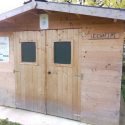Towards an end to the sale of dogs and cats in pet shops throughout the European Union?
Towards an end to the sale of dogs and cats in pet shops throughout the European Union?
10.02.2025
Towards an end to the sale of dogs and cats in pet shops throughout the European Union?
Domestic animals
Photo : Jo-Anne McArthur/One Voice
In 2025, following a proposal from the European Commission, the European Parliament will vote to adopt several measures on the welfare and traceability of dogs and cats within the EU. We have written to them to express our support, and to alert them to the fraudulent maneuvers underway in our country to circumvent existing bans. We remain mobilized and continue to raise public awareness of the condition of cats and dogs in France and Europe.
While the initial text augurs progress, abandoning identification by tattoo in favor of electronic chips, imposing new standards on breeding establishments, banning mutilations for aesthetic purposes (cropping and docking), the first modifications proposed by the MEPs are also promising.
An end to pet shop sales, yes, but the excesses must stop
For the past year, we have been alerting public opinion to the strategies put in place in France, with the complicity of the Ministry of Agriculture, to get around the ban: “click and collect”.
Although in force since January 1, 2024, the law on animal abuse has been seriously misused. Completely contrary to the aim of the ban, this type of practice continues to be encouraged by sellers, who now encourage customers to buy animals on their websites and then collect them in store, like common everyday objects. We have asked MEPs to include a proposal to put a stop to this.
The scourge of online trafficking
We also supported the proposal to create a system for verifying the identification numbers of dogs and cats on online platform ads. These sites open the door to all kinds of abuses, from animals from “puppy mills” to unscrupulous individuals breeding their companions without authorization in order to line their own pockets.
Since we launched our fight against Leboncoin with our partner, several thousand illegal ads for thousands of puppies and kittens have been reported and removed, proving the scale of online trafficking! Several complaints have been filed and are still under investigation. We hope that this first step on the part of the EU will reduce the traffic, until the sale of animals on the Internet is banned altogether.
“Hypertype”: when ‘beauty’ becomes synonymous with suffering
For supposedly aesthetic reasons, some breeders don’t hesitate to push genetic selection to the extreme in order to “produce” animals with morphological characteristics that endanger their health. Bulldogs that can no longer breathe, Chihuahuas or Cavaliers King Charles selected for their big eyes and tiny skulls… much suffering that has prompted some countries, such as Norway and the Netherlands, to introduce legislation. The European Commission seems to recognize the problem, proposing a ban on hypertypes and their display at shows and exhibitions.
Violent training
Several years ago, we revealed the violence involved in training dogs for the ring with supporting images. Spiked collars, electrocution, strangulation… veritable torture sessions for the animals. In 2023, a bill was proposed to ban these coercive tools, but has still not been examined by the Senate. While the Commission’s draft text goes in the right direction by banning electric collars in establishments selling and keeping puppies and kittens, it is unthinkable to stop there. These painful devices must be banned everywhere, especially in dog clubs, but also in private homes.
The draft regulation is currently being examined by the Committee on Agriculture and Rural Development. Members of the European Parliament are currently making amendments, before a first vote in commission at the beginning of April, followed by a vote in Parliament in May or June.
Sign the petition for laws that truly protect our feline and canine companions.
